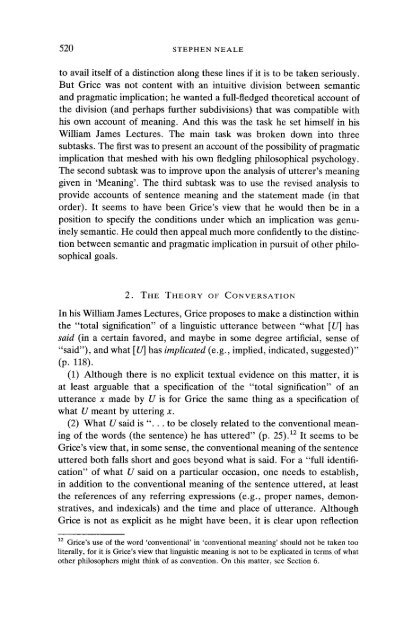Paul Grice and the philosophy of language
Paul Grice and the philosophy of language
Paul Grice and the philosophy of language
Create successful ePaper yourself
Turn your PDF publications into a flip-book with our unique Google optimized e-Paper software.
520 STEPHEN NEALE<br />
to avail itself <strong>of</strong> a distinction along <strong>the</strong>se lines if it is to be taken seriously.<br />
But <strong>Grice</strong> was not content with an intuitive division between semantic<br />
<strong>and</strong> pragmatic implication; he wanted a full-fledged <strong>the</strong>oretical account <strong>of</strong><br />
<strong>the</strong> division (<strong>and</strong> perhaps fur<strong>the</strong>r subdivisions) that was compatible with<br />
his own account <strong>of</strong> meaning. And this was <strong>the</strong> task he set himself in his<br />
William James Lectures. The main task was broken down into three<br />
subtasks. The first was to present an account <strong>of</strong> <strong>the</strong> possibility <strong>of</strong> pragmatic<br />
implication that meshed with his own fledgling philosophical psychology.<br />
The second subtask was to improve upon <strong>the</strong> analysis <strong>of</strong> utterer's meaning<br />
given in 'Meaning'. The third subtask was to use <strong>the</strong> revised analysis to<br />
provide accounts <strong>of</strong> sentence meaning <strong>and</strong> <strong>the</strong> statement made (in that<br />
order). It seems to have been <strong>Grice</strong>'s view that he would <strong>the</strong>n be in a<br />
position to specify <strong>the</strong> conditions under which an implication was genuinely<br />
semantic. He could <strong>the</strong>n appeal much more confidently to <strong>the</strong> distinction<br />
between semantic <strong>and</strong> pragmatic implication in pursuit <strong>of</strong> o<strong>the</strong>r philosophical<br />
goals.<br />
2. THE THEORY OF CONVERSATION<br />
In his William James Lectures, <strong>Grice</strong> proposes to make a distinction within<br />
<strong>the</strong> "total signification" <strong>of</strong> a linguistic utterance between "what [U] has<br />
said (in a certain favored, <strong>and</strong> maybe in some degree artificial, sense <strong>of</strong><br />
"said"), <strong>and</strong> what [U] has implicated (e.g., implied, indicated, suggested)"<br />
(p. 118).<br />
(1) Although <strong>the</strong>re is no explicit textual evidence on this matter, it is<br />
at least arguable that a specification <strong>of</strong> <strong>the</strong> "total signification" <strong>of</strong> an<br />
utterance x made by U is for <strong>Grice</strong> <strong>the</strong> same thing as a specification <strong>of</strong><br />
what U meant by uttering x.<br />
(2) What U said is "... to be closely related to <strong>the</strong> conventional meaning<br />
<strong>of</strong> <strong>the</strong> words (<strong>the</strong> sentence) he has uttered" (p. 25).12 It seems to be<br />
<strong>Grice</strong>'s view that, in some sense, <strong>the</strong> conventional meaning <strong>of</strong> <strong>the</strong> sentence<br />
uttered both falls short <strong>and</strong> goes beyond what is said. For a "full identification"<br />
<strong>of</strong> what U said on a particular occasion, one needs to establish,<br />
in addition to <strong>the</strong> conventional meaning <strong>of</strong> <strong>the</strong> sentence uttered, at least<br />
<strong>the</strong> references <strong>of</strong> any referring expressions (e.g., proper names, demonstratives,<br />
<strong>and</strong> indexicals) <strong>and</strong> <strong>the</strong> time <strong>and</strong> place <strong>of</strong> utterance. Although<br />
<strong>Grice</strong> is not as explicit as he might have been, it is clear upon reflection<br />
~2 <strong>Grice</strong>'s use <strong>of</strong> <strong>the</strong> word 'conventional' in 'conventional meaning' should not be taken too<br />
literally, for it is <strong>Grice</strong>'s view that linguistic meaning is not to be explicated in terms <strong>of</strong> what<br />
o<strong>the</strong>r philosophers might think <strong>of</strong> as convention. On this matter, see Section 6.














